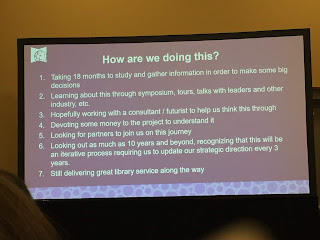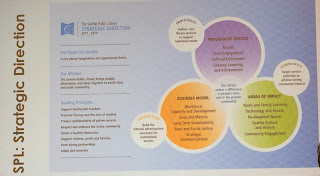LITA Top Technology Trends
Speakers: Ida Joiner (moderator), Victoria Blackmer, Marshall Breeding, Elisandro Cabada, and Alison MacrinaThis Top Tech Trends session was focused on privacy.
What is causing the privacy concerns?
- Internet of things - the connection of the entire world
- Inclusion of sensors in many things that are collecting personal data
- Not all libraries have secure websites - what a person does on a library's website should be private
- A need for libraries to use more encryption
- A recognition that a library's website may be secure, but the ads on it track user activity
- Analytics which capture user information
- Virtual reality and augmented reality
- Data storage
- Facial recognition - they have been some conversations about using facial recognition instead of library cards
- Consumer surveillance devices
- Vendor privacy issues
- People using Alexa, etc., for quick reference questions
- The use of drones
Libraries at the Nexus of Migration
Speakers: Julie Botnick, Derek Johnson, Alex Gil Fuentes, Adriana Blancarte-Hayward, and Christian ZabriskieLots of good information in this session and a resource list. One effort mentioned was the Nimble Tents Toolkit, which is library people combining their efforts on specific, quick response initiatives. Another effort was "Torn apart / seperados". Volume 1 is a "rapidly deployed critical data & visualization intervention in the USA’s 2018 'Zero Tolerance Policy' for asylum seekers at the US Ports of Entry and the humanitarian crisis that has followed." Volume 2 is "a deep and radically new look at the territory and infrastructure of ICE’s financial regime in the USA. This data & visualization intervention peels back layers of culpability behind the humanitarian crisis of 2018."
Okay...so why are libraries getting involved? Libraries are trusted spaces in their communities. They are welcoming places for everyone. Libraries offer information, programs, and resources to everyone. We often do civic engagement because we want to help our communities improve.
What specifically are we doing?
- Providing health information in multiple languages
- Focusing on offering inclusive materials
- Training ourselves to do this work and then building capacity
- Learning about cultural competence and practicing cultural humility
- Building collection in non-English
- Creating program in other languages
- Providing access to legal resources
- Giving information to help people know their rights
- Holding town halls
FUTURE-READYing Your Library: Preparing for the Future Today
Speaker: Marcellus "MT" TurnerMarcellus Turner is the Executive Director and Chief Librarian of the Seattle Public Library. During his introduction of the topic, he said that this might not be what people expected and that it was okay to get up and leave. That made me even more intrigued!
MT and Seattle Public Library are preparing the library of today for tomorrow. While Seattle Public is well-known, that library was built to be the library of tomorrow, but rather to liberate our ideas about what a library can be. Now SPL is working hard to figure out the trends that point to the future needs and what the library must do to meet those needs. The goal is to be proactive, rather than being reactive.
SPL has been on this project for about 18 months and are now at a point where they can begin sharing information. They are still gathering information and do want to engage a futurist, so the work is not yet done. They hope in sharing that they can also learn from others. MT promised that as they continue to learn, they will continue to share. He noted that they have hired a policy officer to help with this effort.
MT showed us this information on their strategic direction, noting that what they do will touch on these three areas: Individual, Community, and the Institution.
This was an interactive session. When we sat down, MT gave each of us a color-coded card, which related to 12 different areas. These are areas that other industries are thinking about, and he emphasized that we need to think about them too. The areas are:
- Emerging Technologies
- Future of Work and Education
- Changing Demographics
- Financial Sustainability
- Corporate Influence and Consumer Expectations
- Climate Change
- Growing Inequality and Inequity
- Urbanization and Density
- Institutional Trust, Privacy, and Big Data
- Library as Concept
- Librarianship and Staffing
- Customer Service and Engagement




No comments:
Post a Comment